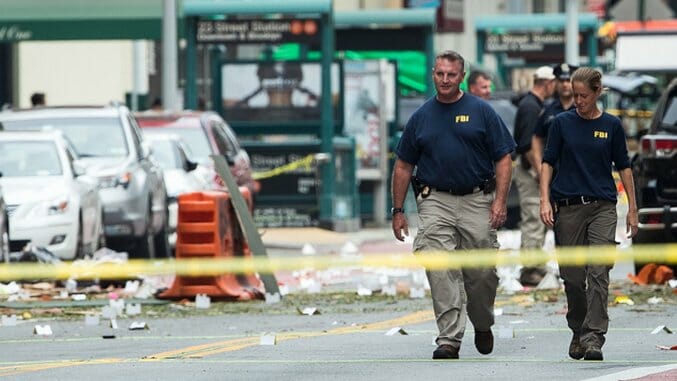When it Comes to Terrorism, It’s Time for Americans to Grow Up
Photo by Drew Angerer/Getty
Last week, on Sep. 11, The Onion ran a story with a typically brilliant headline:
Nation Just Goes Ahead And Decides ‘Freedom Prevails Over Hate’ Is Lesson Of 9/11
Like all of The Onion’s best headlines, this one resonated because of its uncomfortable proximity to truth. The events of September 11 were such a shock to us—a country with very little recent experience being attacked on home soil, much less so dramatically—that we reverted to a very human instinct, which was to seek some deeper spiritual meaning behind the nightmare. It did not seem acceptable to succumb to shock or nihilism, much less to wonder if America had some culpability in what had transpired.
Instead, we told ourselves that we were rallying behind the flag, and that it would only strengthen America’s resolve. We told ourselves that what the terrorists hated was a system of values that could be contained within the word “freedom,” and that what the terrorists represented was a system of values that could be contained within the word “hate.” We told ourselves that America had never been more united, even as free speech was stifled, a terrible president was given carte blanche to start forever wars that would lead us deeper into the mire of foreign conflict and domestic terror, and America was torn apart at the seams—perhaps fatally.
In other words, The Onion nailed it—we chose a simple story because we weren’t capable of dealing with complex truths in the aftermath of something so stunning, and we’ve paid for it.
Now, 15 years later, when the reality of terror is not so shocking—when it’s becoming almost ordinary, and may eventually become so ordinary that it’s mundane, like news of genocide in countries we’ve never cared about—we have to adjust how we react to terrorism. We need a total perspective shift, in fact, or we risk making the critical error of over-reacting, which always has the effect of putting power in the hands of the most reactionary people—people like Donald Trump—who respond in ways that temporarily satisfy our need for power and revenge, but who, in the long run, exacerbate an endless cycle of hatred and violence. By retaliating with the machismo that offers a balm to the wounded American ego, and promises to restore the myth of invincibility to which we’re so sadly, pathetically susceptible, a personality like Trump gives fuel to the enemy, whose subsequent attacks give fuel right back to the reactionaries, guaranteeing perpetual conflict and the death of even moderate centrism. We are standing, yet again, on the precipice of the Manichean worldview that says, “you’re either with us or against us.”
This is the path to self-destruction. As radical as it sounds in an era of propaganda, we need to stop believing in American exceptionalism. If we accept that loving our country means guaranteeing its survival in something like a respectable, democratic form, then we must stop insisting on its essential goodness. Most of all, we must stop reacting to every instance of terror as though our national character is at stake, and anything short of a furious response is admitting cowardice, or lending legitimacy to our enemies.
To minimize terrorism—since “defeating” it is an impossibility that we should give up now, to preserve our sanity—we have to see it clearly. Poetry and spirituality and uplifting narrative, which are always used in the service of nationalism in these cases, are not helpful. They are, in fact, deeply damaging for how they alter our beliefs and create blind, myopic zealots who forfeit any desire except the urge to kill and to die. Combatting terrorism effectively means recognizing two essential components, and no others.
1. Death
Terrorism means death. Sometimes for the terrorists, almost always for at least one victim. Since 1995, there have been fewer than 4,000 deaths in the United States attributable to terrorism, with more than 3,000 of those coming in the September 11 attacks.
What I’m about to say is an uncomfortable thought, since we’ve been indoctrinated to believe that terrorism is a major national problem, and that we’re constantly under siege by radicals. The indoctrination is false: Terrorism is a small problem, with a low death toll, and it needs to be viewed in this context.
Cars also kill 4,000 people in America, but cars do it in less than two months, not 20 years. Guns also kill 4,000 people in America, but guns do it in less than two months, not 20 years. Heart disease also kills 4,000 people in America, but heart disease does it in less than three days, not 20 years. Same with cancer.
Your likelihood of getting killed by a terrorist in America, in the years since 9/11, is about equal to your likelihood of getting crushed to death by furniture. It represents a tiny, almost negligible risk, and the fact that the delivery mechanism of this death happens to be more dramatic than most should not change our understanding of its numerical smallness. There is personal tragedy in these cases, and personal tragedy can be exploited by politicians and the media for sensationalistic purposes, but it’s important to remember that these personal tragedies are no more tragic than the innocent life cut short in a car accident, or a suicide, or a U.S. drone strike that mistakenly impacts a civilian population.
Terrorism in America is a problem—a minuscule problem, that deserves less hyperbole than we give it. It especially does not deserve the kind of attention that winds up radicalizing Americans and justifying unnecessary wars that turn into very big problems indeed.
As an agent of death, terrorism is wildly inefficient. We have far bigger concerns that should occupy our thoughts.
2. Politics
Terrorism is, at its heart, a political problem. We were not attacked on 9/11, or any time subsequently, because our enemies “hate freedom” or are “cowards.” The charge of cowardice is fundamentally stupid for reasons that are too obvious to explain, and the hating of freedom is worse—a simplification, an irrelevance. These are the kinds of explanations you give to children, when you don’t think they’re capable of understanding the complex mechanisms of our world. We, on the other hand, are adults, and the fact that we’re allowing our leaders to coddle us with this transparent bullshit is perhaps the saddest aspect of modern American life.
Nobody gets attacked for no good reason. Sometimes, a mentally ill person succumbs to an attractive ideology and embarks on a vigilante quest for violence and death. Other times, a group of people conspire to strike a blow against a nation like America for political reasons. In both cases—and this is a tough pill for the American exceptionalists to swallow—we need to admit our culpability.
It’s a foggy culpability in the case of mental illness—why are there more young men finding justification in extremist Islam or white supremacy or pure misogyny or just the death impulse to commit these heinous acts? It’s difficult to answer the question of how we’ve failed them, but we indisputably have. The havoc they wreak, the death they cause, is a referendum on America, even if we’d like to console ourselves with the fantasy that they are isolated agents, non-repeatable, whose native conditions have not been aggravated and mutated by the condition of modern life. Blood is on every hand.
In the case of political terrorism, only a case of breathtaking naivete could credit the belief that our past actions have played no part in the attacks. (But of course, these cases of naivete are so common that they’re actually the norm.) A year after 9/11, Osama Bin Laden wrote a “”Letter to America outlining some of his justifications for the attack. Here they are summarized, via Wikipedia:
Western support for attacking Muslims in Somalia, supporting Russian atrocities against Muslims in Chechnya, supporting the Indian oppression against Muslims in Kashmir, the Jewish aggression against Muslims in Lebanon, the presence of US troops in Saudi Arabia, US support of Israel, and sanctions against Iraq.
My point is not to argue whether these complaints are legitimate, or whether their legitimacy would justify an act like 9/11. My point is that to Bin Laden and his followers, they were legitimate, and they did justify it. This is a far cry from the “hating freedom” bromide we feed ourselves in an attempt to divide the world into good and evil, and to erase all traces of our own responsibility.
This is not the post where I dictate what America’s foreign policy should look like in the 21st century, or to take a full reckoning of its past failures. That information is eminently accessible for those who want to find it. Instead, I want to suggest that in order to understand political terrorism, we also have to understand the damage wrought by our past. We need to undergo a complete psychological transformation, and to grasp the unpleasant truth that to a certain undeniable extent, we are witnessing our own demons coming home to roost. And in order to slow the tide of these attacks in the future, we need to adjust. This doesn’t mean conceding ideological ground to terrorists, or implying that the violence they commit is righteous. It means transforming America into a country that inflicts less pain throughout the world, and invites less pain onto itself.
The sooner we understand the blame we bear, and the sooner we understand the actual scope of the problem, the sooner we can fix things in a measured, intelligent manner. But if we continue to approach this complex problem with childish wish-fulfillment, believing that America is the archetypal father who can do no wrong and who must always be worshipped and avenged, we will continue to suffer. We are mired in a logical adolescence, and rooted in arrested development by our own facile understanding of the world. We need—so badly, and so urgently—to grow the fuck up.







































